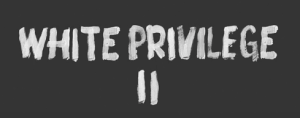 In the recently released “White Privilege II”, white rappers Macklemore and Ryan Lewis address uncomfortable questions of cultural appropriation and the role of white Americans in support of the protests over Blacks being shot by police. The song starts out this way, with Macklemore referencing the the 2014 Black Lives Matter march in Ferguson, Mo., that he participated in:
In the recently released “White Privilege II”, white rappers Macklemore and Ryan Lewis address uncomfortable questions of cultural appropriation and the role of white Americans in support of the protests over Blacks being shot by police. The song starts out this way, with Macklemore referencing the the 2014 Black Lives Matter march in Ferguson, Mo., that he participated in:
Pulled into the parking lot, parked it
Zipped up my parka, joined the procession of marchers
In my head like, “Is this awkward?
Should I even be here marching?”
Thinking if they can’t, how can I breathe?
Thinking that they chant, what do I sing?
I want to take a stance cause we are not free
And then I thought about it, we are not “we”
Can the “we”, i.e. those marching, include someone (white) who has not had the same experiences as those (blacks) marching? Should he be a participant or just an observer:
“Am I on the outside looking in,
Or am I on the inside looking out?
Is it my place to give my two cents
Or should I stand on the side and shut my mouth?
‘No justice no peace’
Oh yeah, I’m saying that.
They chanting out BLACK LIVES MATTER
But I don’t say it back.
Is it O.K. for me to say? I don’t know, so I watch and stand.”
The song is actually a sequel to the the 2005 release “White Privilege”. It may be that the title of the new song is in part an effort to remind us that Macklemore’s not a Johnny-come-lately to the issue. On the original “White Privilege,” he had already acknowledged the fact that he’s using an art form that has its origins in a wholly different context from his: “Hip-hop started off in a block that I’ve never been to/ To counter act a struggle that I’ve never even been through”. Macklemore is not of course the first white rapper; as he mentions in the song there have been a whole host of singers, going back at least to Elvis who have built careers off of songs or styles originating in African-American culture. Not all have acknowledged the debt or pointed to the potential unfairness of the process: “We take all we want from black culture, but will we show up for Black Lives [Matter].”
Macklemore ends the song with Black poet and singer Jamila Woods singing the final lines, which some have interpreted as an attempt to legitimize his right to rap on this topic by including a supportive Black voice. Gene Demby, the lead blogger for NPR’s Code Switch team, who is African-American, wrote a piece this week, “Guess We Gotta Talk About Macklemore’s ‘White Privilege’ Song”, indicating by its title and its opening (“So. Macklemore. I suppose we have to talk about Macklemore.”) a distinct lack of enthusiasm. He does credit Macklemore with good intentions, and admits that engaging in dialog (at least among whites) is helpful:
It’s worth noting that Deray McKesson, one of the faces of the Black Lives Matter movement, has argued that this song does exactly what lots of people say they want more of in conversations about race — that is, it would be great if more white folks actively engaged in uncomfortable conversations about race with each other. McKesson’s note was ostensibly an endorsement, but it’s also an acknowledgement that this song is not really meant for people of color. That would seem to underscore Macklemore’s larger existential dilemma regarding his relationship to black audiences: He really seems to want to be talking to us, but he’s not saying anything we don’t already know.
At nine minutes long, the song may not prove to be a hit, but it does stir the pot.